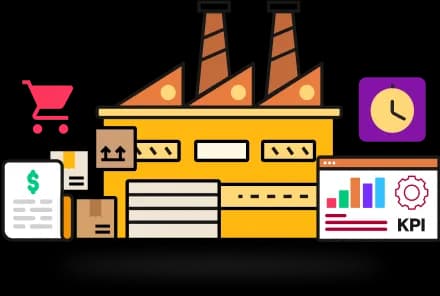Industry
Industrial Manufacturing
High Tech & Electronics
Footwear Manufacturing
Apparel & Textiles
Food & Beverage
Rubber & Plastics
Metal Fabrication
Industrial Machinery & Equipment
Construction & Engineering
Furnitures & Fixtures
Medical Device Manufacturing
Automotive Manufacturing
Aerospace And Defence
Screw Shop Manufacturing
Spring Shop Manufacturing
Solutions
Pricing
Resources
Company
GST Legacy
GST impact on the Indian textile industry
India is the second largest fiber producing country in the world with an export revenue of US$ 40 Billion in FY 2015-16. This oldest industry of Indian economy provides employment to more than 50 million people. It is a labor intensive sector and also the largest contributing industry to the total export of India with 11%. The un-organized sector of textile comprises handloom, handicraft, and sericulture whereas the organized sector includes spinning, apparel, and garments.
Presently, the Indian textile industry is worth of US$ 108 billion and economists expect it to reach US$ 223 billion by 2021. According to a study conducted by Wazir Advisors and PCI Xylenes & Polyester, this industry has the potential to reach US$ 500 billion in the future. The domestic sales will rise from current US$ 68 billion to US$ 315 billion. On a similar note, export will increase from US$ 41 billion to US$ 185 billion.
Implementation of GST will influence this prominent economic sector by revamping the existing indirect tax slabs. This article will try to elaborate how GST on textile will bring significant changes in the industry.
Shifting towards an organized sector
A substantial segment of the Indian textile industry operates under the unorganized sector. It creates a gap in the input tax credit system. If the registered taxpayers buy inputs from the unorganized sector, they can not avail input tax credit facility. GST on textile will bring a significant change in the input tax credit system and it will create an important balance between organized and unorganized sectors of the industry. In fact, GST will help the entire textile industry in shifting towards an organized sector.
Low Manufacturing Cost
As a unified tax system, GST will include several fringe taxes including entry tax, luxury tax, octroi, etc. It will help in reducing manufacturing cost in the industry and as a result, the textile manufacturers will earn a high profit by contributing more to the Indian economy.
Input Tax Credit for Capital Goods
Presently, Indian textile manufacturers need to pay heavy excise duty while importing capital goods. This excise duty is costly as input tax credit facility is not available under current tax laws. But with GST’s launch, the excise duty will have input tax credit facility and it will decrease the total import cost for capital goods.
Textile industry will be more competitive
As per the Secretary of ITF (Indian Texpreneurs Federation) Prabhu Dhamodharan, GST will restructure the input tax credit claiming process. It will make the entire textile industry more aggressive in the export market. In addition to this, input tax credit will be a significant step for promoting the export of textile products. It will also encourage the manufacturers to adopt cutting-edge production system to develop existing products.
GST will encourage the farmers
Cotton yarn and fabrics will come under 5% GST tax slab and it will inspire the farmers to grow ample amount of cotton more than before. The farmers will get the accurate price for their hard work. Experts are expecting that GST on textile will create development in the entire value chain.
Readymade garments will be costlier
GST on readymade garments will create a huge difference in the current consumption. The tax slab will be 12% under GST while the present slab is 4-5% VAT and 2% excise. This higher tax slab will definitely increase the price of readymade garments for the consumers.
GST on apparel
The Indian government has decided to keep 5% GST on apparels that are below than INR 1000 and apparels beyond this price will have 12% GST rate.
“In India, mass consumption of apparel is generally below Rs 1000. With the increasing purchasing capacity, change in the tax system will not have an impact on the buying pattern of consumers,” Prabhu Damodaran, Secretary, Indian Texpreneurs Federation.
Developing Forward
Definitely, GST will bring vast changes in the textile industry of India. Man-made or synthetic fiber yarn will have 18%, readymade garments will have 12%, and cotton yarn and fabrics will come under 5% GST tax slab. Silk and jute will not have any indirect tax under GST. While GST will simplify the current procedures by converging various complex indirect taxes into a unified platform, it will also improve the textile export scenario of India.
Get Started with Deskera
Benefits of cloud business software
- Productivity
- Implementation
- Mobility
- Scalability
- Security
See related articles about India GST
What our Customers Say About Us
Whatever your business
size, Deskera enables you to
simplify operations across
business functions. Here's
what our customers say
about us.


At GoDo, we understand that managing our finances and customer relationships is essential for our success. Deskera has provided us with an easy to use and intuitive platform that has enabled us to access our financial data, track customer relationships, and manage our finances with ease. We have been able to streamline our processes, better manage our finances, and stay on top of our customer relationships. We highly recommend Deskera to any business that is looking to stay organized and efficient.
Wesley Wright
CEO, GoDo Life


We are extremely pleased with our decision to switch to Deskera and have seen a significant improvement in our business operations since making the switch. The sales process was smooth from start to finish and customer support at every step of the implementation was stellar. Highly recommend Deskera to those looking for a great ERP solution.
Wally Mears
CEO, The Jungle

We implemented Deskera's integrated platform to improve our procurement and inventory management processes to streamline our operations and improve efficiencies. I highly recommend their platform to any company looking to accelerate their growth.
Scott Phetsalod
Laboratory Manager
Run Your Business With Deskera

Products
Use Cases
 , India
, India  , Singapore
, Singapore  , and Canada
, and Canada  with
with 


